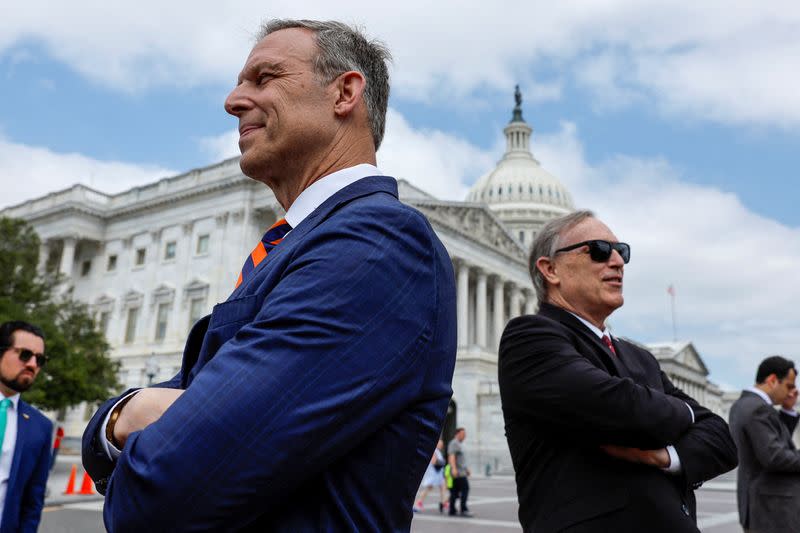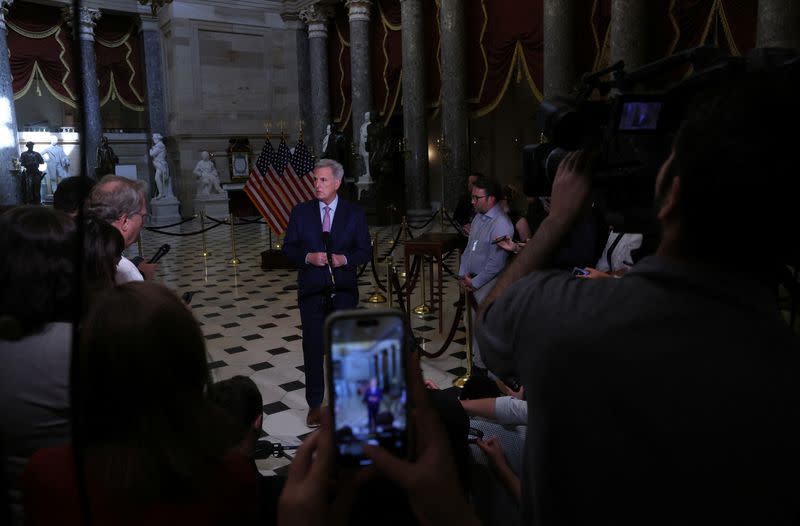Republican feud over 'root canal' spending cuts raises US government shutdown risk
- Oops!Something went wrong.Please try again later.
- Oops!Something went wrong.Please try again later.
By David Morgan
WASHINGTON (Reuters) -A feud over spending cuts between hardline and centrist Republicans in the U.S. House of Representatives raises the risk that the federal government will suffer its fourth shutdown in a decade this fall.
Members of the hardline House Freedom Caucus are pushing to cut spending to a fiscal 2022 level of $1.47 trillion, $120 billion less than President Joe Biden and House Speaker Kevin McCarthy agreed to in their May debt ceiling compromise. The group on Monday announced its opposition to any stopgap measure to keep the government afloat that fails to meet its demands.
With Republicans also seeking higher spending on defense, veterans benefits and border security, analysts say the hardline target would mean cuts of up to 25% in areas such as agriculture, infrastructure, science, commerce, water and energy and healthcare.
Goldman Sachs analysts in a Monday research note said that a shutdown looks "more likely than not."
Centrists, who call themselves "governing" Republicans, say their hardline colleagues are ignoring the fact that their priorities are rejected by Democrats who control the Senate and White House, and that spending will wind up near the level agreed by McCarthy and Biden anyway.
The result is a major headache for centrist Republicans from swing districts that Biden won in 2020 and others with constituents in the firing line of hardline spending targets.
"The reductions are so deep," said Representative Don Bacon, a centrist Republican from Nebraska. "They want to make everything a root canal."
Hardliners view the 2024 fiscal year that begins on Oct. 1 as a test of Republican resolve to reduce the federal debt and move on to reform social programs including Medicare and Social Security.
"I don't fault any individual member for raising concerns and wanting to make sure that the bill is right for them and for their district," said Representative Ben Cline, who belongs to the Freedom Caucus, the conservative Republican Study Committee and the bipartisan Problem Solvers Caucus.
"What there has to be is an understanding that for there to be 218 Republican votes, the spending needs to be in line with pre-COVID levels rather than the debt-limit agreement."
One significant source of frustration is hardline demands for cuts to bills that have already been vetted by the 61-member House Appropriations Committee.
"We're not, willy-nilly, just trying to give money away. We're trying to focus and prioritize," said Representative David Joyce, a member of the appropriations panel who heads the 42-member centrist Republican Governance Group.
With Democrats opposed to hardline proposals, McCarthy can afford to lose no more than four Republican votes if he hopes to pass all 12 appropriations bills before funding expires on Sept. 30.
"I do not know how they get themselves out of this jam," said William Hoagland, a former Senate Republican budget director now at the Bipartisan Policy Center think tank.
TRICKY PATH
When the House returns from summer recess on Sept. 12, lawmakers will have 12 days to complete their bills and hammer out compromise legislation with the Senate or risk a partial government shutdown.
McCarthy acknowledged last week they may have to resort to a stopgap funding bill, known as a "continuing resolution," or CR, to keep federal agencies open.
But that option could be complicated by new House Freedom Caucus demands on Monday that a stopgap measure must reduce spending, resume some of former President Donald Trump's border policies, address the "weaponization" of the Justice Department and eliminate programs on diversity and transgender issues.
The caucus also said it opposes new funding for Ukraine.
Some House Republicans say the challenges on appropriations are similar to disagreements McCarthy has overcome on other major legislation, including an April Republican debt ceiling bill that cemented his negotiating position in talks with Biden.
"The more appropriations bills we can get across the finish line, the more we'll have the leverage we need to negotiate a good deal with the Senate," said Representative Dusty Johnson, who chairs the Main Street Caucus, whose members describe themselves as "pragmatic conservatives".
Failure would mean another costly government shutdown starting in October, which would be the fourth in a decade.
SHUTDOWN RISK
House Freedom Caucus members say a shutdown could be necessary to achieve their objectives.
"It's not something that the members of the Freedom Caucus generally wish for," said Representative Scott Perry, who chairs the group of roughly three dozen conservatives.
"But we also understand that very little happens in Washington that's difficult, without someone or something forcing it to happen," he told Reuters.
Senate Majority Leader Chuck Schumer, the top Democrat in Congress, said last week that Republicans will be to blame for any new shutdown "if the House decides to go in a partisan direction."
Disputes over funding and policy have shut down the federal government three times in the past decade: once in 2013 over healthcare spending and twice in 2018 over immigration. A 35-day shutdown that began in December 2018 and ran into January 2019 cost the economy 0.02% of GDP, according to the nonpartisan Congressional Budget Office.
This time, the slim 222-212 House Republican majority could pay a political price. A shutdown would disrupt the lives of Americans barely a year before the 2024 election, when Republicans must defend 18 House seats in districts that Biden won in 2020.
McCarthy could have to resort to a CR that requires bipartisan support to pass, neutralizing the hardliners, analysts said.
That could endanger McCarthy's speakership under a deal he struck allowing a single lawmaker to move for his dismissal.
Would the House Freedom Caucus end McCarthy's reign over a CR?
"I wouldn't go that far," Perry said. "That's a final option. We want to work with the leadership. We want to work with Kevin, and we think that we can."
(Reporting by David Morgan; Editing by Scott Malone, Daniel Wallis and Cynthia Osterman)


